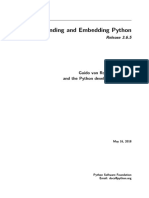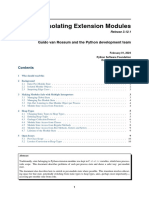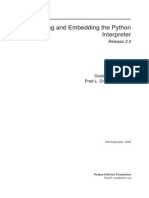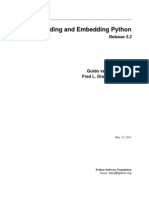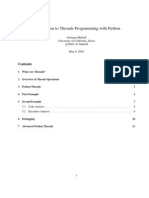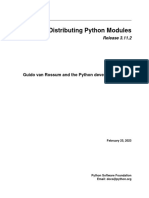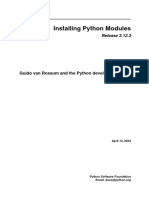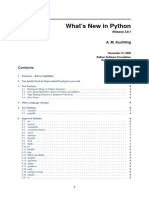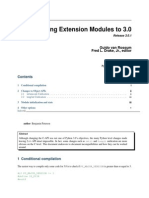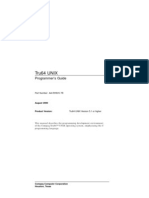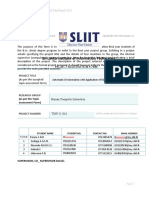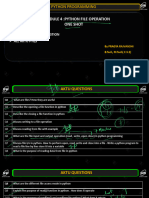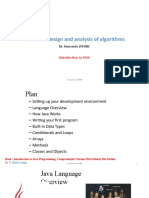C API Extension Support for Free
Threading
Release 3.13.5
Guido van Rossum and the Python development team
June 11, 2025
Python Software Foundation
Email: docs@python.org
Contents
1 Identifying the Free-Threaded Build in C 1
2 Module Initialization 2
2.1 Multi-Phase Initialization . . . . . . . . . . . . . . . . . . . . . . . . . . . . . . . . . . . . . . . 2
2.2 Single-Phase Initialization . . . . . . . . . . . . . . . . . . . . . . . . . . . . . . . . . . . . . . . 2
3 General API Guidelines 3
3.1 Container Thread Safety . . . . . . . . . . . . . . . . . . . . . . . . . . . . . . . . . . . . . . . . 3
4 Borrowed References 3
5 Memory Allocation APIs 4
6 Thread State and GIL APIs 4
7 Protecting Internal Extension State 4
8 Building Extensions for the Free-Threaded Build 4
8.1 Limited C API and Stable ABI . . . . . . . . . . . . . . . . . . . . . . . . . . . . . . . . . . . . 5
8.2 Windows . . . . . . . . . . . . . . . . . . . . . . . . . . . . . . . . . . . . . . . . . . . . . . . 5
Starting with the 3.13 release, CPython has experimental support for running with the global interpreter lock (GIL)
disabled in a configuration called free threading. This document describes how to adapt C API extensions to support
free threading.
1 Identifying the Free-Threaded Build in C
The CPython C API exposes the Py_GIL_DISABLED macro: in the free-threaded build it’s defined to 1, and in the
regular build it’s not defined. You can use it to enable code that only runs under the free-threaded build:
#ifdef Py_GIL_DISABLED
/* code that only runs in the free-threaded build */
#endif
1
� ® Note
On Windows, this macro is not defined automatically, but must be specified to the compiler when building. The
sysconfig.get_config_var() function can be used to determine whether the current running interpreter
had the macro defined.
2 Module Initialization
Extension modules need to explicitly indicate that they support running with the GIL disabled; otherwise importing
the extension will raise a warning and enable the GIL at runtime.
There are two ways to indicate that an extension module supports running with the GIL disabled depending on whether
the extension uses multi-phase or single-phase initialization.
2.1 Multi-Phase Initialization
Extensions that use multi-phase initialization (i.e., PyModuleDef_Init()) should add a Py_mod_gil slot in
the module definition. If your extension supports older versions of CPython, you should guard the slot with a
PY_VERSION_HEX check.
static struct PyModuleDef_Slot module_slots[] = {
...
#if PY_VERSION_HEX >= 0x030D0000
{Py_mod_gil, Py_MOD_GIL_NOT_USED},
#endif
{0, NULL}
};
static struct PyModuleDef moduledef = {
PyModuleDef_HEAD_INIT,
.m_slots = module_slots,
...
};
2.2 Single-Phase Initialization
Extensions that use single-phase initialization (i.e., PyModule_Create()) should call PyUnsta-
ble_Module_SetGIL() to indicate that they support running with the GIL disabled. The function is only
defined in the free-threaded build, so you should guard the call with #ifdef Py_GIL_DISABLED to avoid
compilation errors in the regular build.
static struct PyModuleDef moduledef = {
PyModuleDef_HEAD_INIT,
...
};
PyMODINIT_FUNC
PyInit_mymodule(void)
{
PyObject *m = PyModule_Create(&moduledef);
if (m == NULL) {
return NULL;
}
#ifdef Py_GIL_DISABLED
PyUnstable_Module_SetGIL(m, Py_MOD_GIL_NOT_USED);
#endif
(continues on next page)
2
� (continued from previous page)
return m;
}
3 General API Guidelines
Most of the C API is thread-safe, but there are some exceptions.
• Struct Fields: Accessing fields in Python C API objects or structs directly is not thread-safe if the field may
be concurrently modified.
• Macros: Accessor macros like PyList_GET_ITEM and PyList_SET_ITEM do not perform any error check-
ing or locking. These macros are not thread-safe if the container object may be modified concurrently.
• Borrowed References: C API functions that return borrowed references may not be thread-safe if the con-
taining object is modified concurrently. See the section on borrowed references for more information.
3.1 Container Thread Safety
Containers like PyListObject, PyDictObject, and PySetObject perform internal locking in the free-threaded
build. For example, the PyList_Append() will lock the list before appending an item.
PyDict_Next
A notable exception is PyDict_Next(), which does not lock the dictionary. You should use
Py_BEGIN_CRITICAL_SECTION to protect the dictionary while iterating over it if the dictionary may be
concurrently modified:
Py_BEGIN_CRITICAL_SECTION(dict);
PyObject *key, *value;
Py_ssize_t pos = 0;
while (PyDict_Next(dict, &pos, &key, &value)) {
...
}
Py_END_CRITICAL_SECTION();
4 Borrowed References
Some C API functions return borrowed references. These APIs are not thread-safe if the containing object is modified
concurrently. For example, it’s not safe to use PyList_GetItem() if the list may be modified concurrently.
The following table lists some borrowed reference APIs and their replacements that return strong references.
Borrowed reference API Strong reference API
PyList_GetItem() PyList_GetItemRef()
PyDict_GetItem() PyDict_GetItemRef()
PyDict_GetItemWithError() PyDict_GetItemRef()
PyDict_GetItemString() PyDict_GetItemStringRef()
PyDict_SetDefault() PyDict_SetDefaultRef()
PyDict_Next() none (see PyDict_Next)
PyWeakref_GetObject() PyWeakref_GetRef()
PyWeakref_GET_OBJECT() PyWeakref_GetRef()
PyImport_AddModule() PyImport_AddModuleRef()
Not all APIs that return borrowed references are problematic. For example, PyTuple_GetItem() is safe because
tuples are immutable. Similarly, not all uses of the above APIs are problematic. For example, PyDict_GetItem()
3
�is often used for parsing keyword argument dictionaries in function calls; those keyword argument dictionaries are
effectively private (not accessible by other threads), so using borrowed references in that context is safe.
Some of these functions were added in Python 3.13. You can use the pythoncapi-compat package to provide imple-
mentations of these functions for older Python versions.
5 Memory Allocation APIs
Python’s memory management C API provides functions in three different allocation domains: “raw”, “mem”, and
“object”. For thread-safety, the free-threaded build requires that only Python objects are allocated using the object
domain, and that all Python object are allocated using that domain. This differs from the prior Python versions, where
this was only a best practice and not a hard requirement.
® Note
Search for uses of PyObject_Malloc() in your extension and check that the allocated memory is used for
Python objects. Use PyMem_Malloc() to allocate buffers instead of PyObject_Malloc().
6 Thread State and GIL APIs
Python provides a set of functions and macros to manage thread state and the GIL, such as:
• PyGILState_Ensure() and PyGILState_Release()
• PyEval_SaveThread() and PyEval_RestoreThread()
• Py_BEGIN_ALLOW_THREADS and Py_END_ALLOW_THREADS
These functions should still be used in the free-threaded build to manage thread state even when the GIL is disabled.
For example, if you create a thread outside of Python, you must call PyGILState_Ensure() before calling into
the Python API to ensure that the thread has a valid Python thread state.
You should continue to call PyEval_SaveThread() or Py_BEGIN_ALLOW_THREADS around blocking operations,
such as I/O or lock acquisitions, to allow other threads to run the cyclic garbage collector.
7 Protecting Internal Extension State
Your extension may have internal state that was previously protected by the GIL. You may need to add locking to
protect this state. The approach will depend on your extension, but some common patterns include:
• Caches: global caches are a common source of shared state. Consider using a lock to protect the cache or
disabling it in the free-threaded build if the cache is not critical for performance.
• Global State: global state may need to be protected by a lock or moved to thread local storage. C11 and
C++11 provide the thread_local or _Thread_local for thread-local storage.
8 Building Extensions for the Free-Threaded Build
C API extensions need to be built specifically for the free-threaded build. The wheels, shared libraries, and binaries
are indicated by a t suffix.
• pypa/manylinux supports the free-threaded build, with the t suffix, such as python3.13t.
• pypa/cibuildwheel supports the free-threaded build if you set CIBW_ENABLE to cpython-freethreading.
4
�8.1 Limited C API and Stable ABI
The free-threaded build does not currently support the Limited C API or the stable ABI. If you use setuptools to
build your extension and currently set py_limited_api=True you can use py_limited_api=not sysconfig.
get_config_var("Py_GIL_DISABLED") to opt out of the limited API when building with the free-threaded
build.
® Note
You will need to build separate wheels specifically for the free-threaded build. If you currently use the stable
ABI, you can continue to build a single wheel for multiple non-free-threaded Python versions.
8.2 Windows
Due to a limitation of the official Windows installer, you will need to manually define Py_GIL_DISABLED=1 when
building extensions from source.
µ See also
Porting Extension Modules to Support Free-Threading: A community-maintained porting guide for extension
authors.




